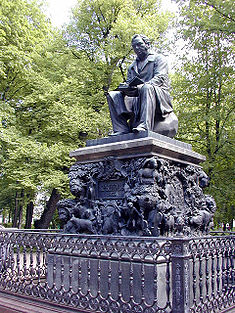Ivan Krylov: Difference between revisions
remove russianness |
commons |
||
| Line 8: | Line 8: | ||
Krylov's [[statue]] in the [[Summer Garden]] (1854-55) is one of the finest monuments in [[St.Petersburg]]. It is also the first monument to a poet erected in [[Eastern Europe]]. All four sides of the pedestal represent scenes from Krylov's archetypal fables. |
Krylov's [[statue]] in the [[Summer Garden]] (1854-55) is one of the finest monuments in [[St.Petersburg]]. It is also the first monument to a poet erected in [[Eastern Europe]]. All four sides of the pedestal represent scenes from Krylov's archetypal fables. |
||
{{commons|Ivan Krylov}} |
|||
[[Category:Russian fabulists|Krylov, Ivan]] |
[[Category:Russian fabulists|Krylov, Ivan]] |
||
Revision as of 13:05, 12 March 2007
Ivan Andreyevich Krylov (Russian: Ива́н Андре́евич Крыло́в) (February 13, 1769 - November 21, 1844) was the most famous Russian fabulist. Some of Krylov's earlier fables are loosely based on Aesop and Jean de La Fontaine, but later fables are his own creation.
Ivan Krylov was born in Moscow, but spent his early years in Orenburg and Tver. His father, a distinguished military officer, died in 1779. Young Krylov was left with no fortune, and was brought up by his mother. In the course of a few years his mother removed to St.Petersburg, in the hope of securing a government pension. There, Krylov obtained a post in the civil service, but he gave it up immediately after his mother's death in 1788. Already in 1783, he had sold to a bookseller a comedy of his own composition, and by this means had procured for himself the works of Molière, Racine, Boileau; probably under the influence of these writers, he produced Philomela, which gave him access to the dramatic circle of Knyazhnin.

Several attempts Krylov made to start a literary magazine met with little success; but, together with his plays, they served to make the author known in society. For about four years (1797-1801) Krylov lived at the country seats of Prince Sergey Galitzine, and when the prince was appointed military governor of Livonia he accompanied him as official secretary. Of the years which follow his resignation of this post little is known, the common opinion being that he wandered from town to town under the influence of a passion for card-playing. Before long he found his place as a fabulist, the first collection of his Fables, 23 in number, appearing in 1809. From 1812 to 1841 he held a congenial appointment in the Imperial Public Library first as assistant, and then as head of the Russian books department.
Honors were showered upon Krylov while he yet lived: the Russian Academy of Sciences admitted him a member in 1811, and bestowed upon him its gold medal; in 1838 a great festival was held under imperial sanction to celebrate the jubilee of his first appearance as an author; and the emperor assigned him a handsome pension. By the time he died, 77,000 copies of his fables had been sold in Russia, and his wisdom and humor gained popularity. His fables were often rooted in historic events, and are easily recognizable by their beauty of language and engaging story. Though he began as a translator and imitator of existing fables, Krylov soon showed himself a master of invention, who found abundant original material in his native land. To the Russian ear his verse is of matchless quality; while word and phrase are direct, simple and eminently idiomatic, color and cadence vary with the theme.
Krylov's statue in the Summer Garden (1854-55) is one of the finest monuments in St.Petersburg. It is also the first monument to a poet erected in Eastern Europe. All four sides of the pedestal represent scenes from Krylov's archetypal fables.
- This article incorporates text from a publication now in the public domain: Chisholm, Hugh, ed. (1911). Encyclopædia Britannica (11th ed.). Cambridge University Press.
{{cite encyclopedia}}: Missing or empty|title=(help)
